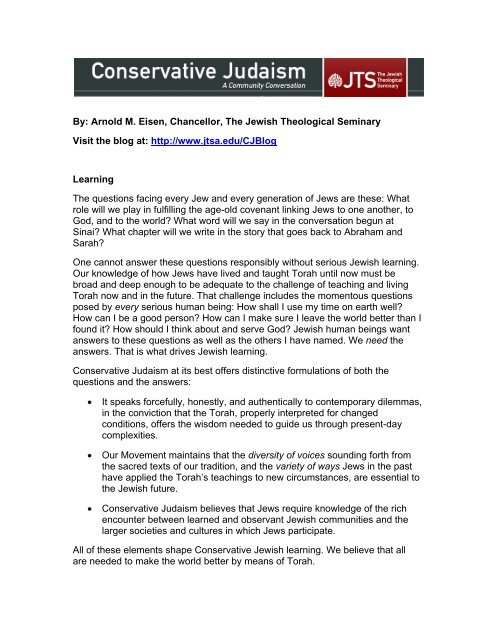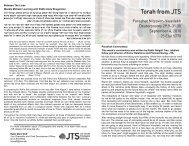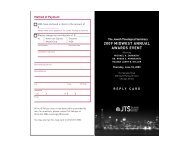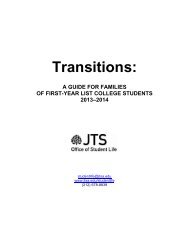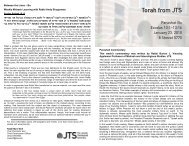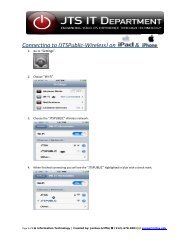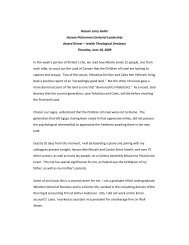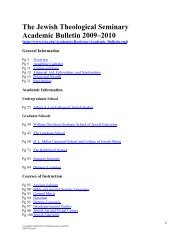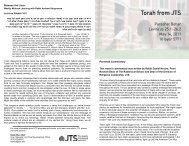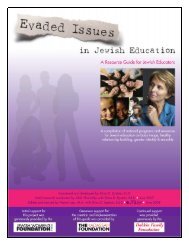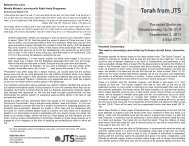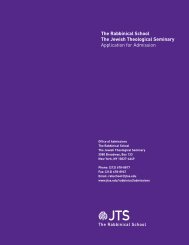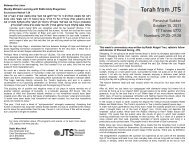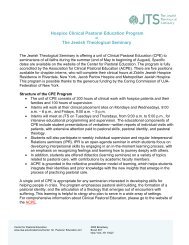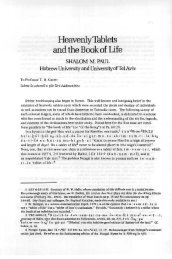Print This Essay - The Jewish Theological Seminary
Print This Essay - The Jewish Theological Seminary
Print This Essay - The Jewish Theological Seminary
Create successful ePaper yourself
Turn your PDF publications into a flip-book with our unique Google optimized e-Paper software.
By: Arnold M. Eisen, Chancellor, <strong>The</strong> <strong>Jewish</strong> <strong>The</strong>ological <strong>Seminary</strong><br />
Visit the blog at: http://www.jtsa.edu/CJBlog<br />
Learning<br />
<strong>The</strong> questions facing every Jew and every generation of Jews are these: What<br />
role will we play in fulfilling the age-old covenant linking Jews to one another, to<br />
God, and to the world? What word will we say in the conversation begun at<br />
Sinai? What chapter will we write in the story that goes back to Abraham and<br />
Sarah?<br />
One cannot answer these questions responsibly without serious <strong>Jewish</strong> learning.<br />
Our knowledge of how Jews have lived and taught Torah until now must be<br />
broad and deep enough to be adequate to the challenge of teaching and living<br />
Torah now and in the future. That challenge includes the momentous questions<br />
posed by every serious human being: How shall I use my time on earth well?<br />
How can I be a good person? How can I make sure I leave the world better than I<br />
found it? How should I think about and serve God? <strong>Jewish</strong> human beings want<br />
answers to these questions as well as the others I have named. We need the<br />
answers. That is what drives <strong>Jewish</strong> learning.<br />
Conservative Judaism at its best offers distinctive formulations of both the<br />
questions and the answers:<br />
• It speaks forcefully, honestly, and authentically to contemporary dilemmas,<br />
in the conviction that the Torah, properly interpreted for changed<br />
conditions, offers the wisdom needed to guide us through present-day<br />
complexities.<br />
• Our Movement maintains that the diversity of voices sounding forth from<br />
the sacred texts of our tradition, and the variety of ways Jews in the past<br />
have applied the Torah’s teachings to new circumstances, are essential to<br />
the <strong>Jewish</strong> future.<br />
• Conservative Judaism believes that Jews require knowledge of the rich<br />
encounter between learned and observant <strong>Jewish</strong> communities and the<br />
larger societies and cultures in which Jews participate.<br />
All of these elements shape Conservative <strong>Jewish</strong> learning. We believe that all<br />
are needed to make the world better by means of Torah.
Louis Finkelstein, the chancellor of <strong>The</strong> <strong>Jewish</strong> <strong>The</strong>ological <strong>Seminary</strong> from 1940<br />
to 1972, summed up what he considered the “fundamental premises” of<br />
Conservative Judaism in the twin affirmations that Judaism “is a developing<br />
religion” that has always undergone change; and that “this change was not one<br />
of deterioration and ossification but of growth, self-expression and foliation.” Our<br />
task and privilege, now as ever, is both to study the sages of old and to emulate<br />
them: to render Judaism compelling for our revolutionary age, as our learned<br />
ancestors did for theirs.<br />
Finkelstein’s statement explains why, for Conservative Jews even more than<br />
others, the rabbinic principle holds. “Talmud Torah ke-neged kulam: the study of<br />
Torah is weighed against the importance of all the other commandments<br />
combined.” <strong>The</strong> task of following the Torah’s precepts is difficult. Relating Torah<br />
to the finest insights of the larger culture and responsibly adapting Judaism to<br />
changed conditions, when necessary, is still more so. Both tasks require<br />
thorough, complex, and nuanced knowledge of the <strong>Jewish</strong> past, including<br />
understanding of the manifold ways in which Jews over the centuries have<br />
interacted with the larger cultures of which they were a part.<br />
Indeed, the Conservative vision of Judaism as evolving religious civilization only<br />
makes sense if one has studied enough <strong>Jewish</strong> history to know that our tradition<br />
has always been evolving in this fashion—sometimes radically and sometimes<br />
gradually, at times explicitly and at other moments unaware.<br />
Learning Torah, for Conservative Jews as for all others, remains one of<br />
Judaism’s major commandments—a discipline of study and practice that I shall<br />
describe in detail in my next posting.<br />
But it is crucial to stress, as Finkelstein did, that Jews often come to love the<br />
learning of Torah. That passion is nurtured for Conservative Jews, I think, by the<br />
distinctive ways in which our learning combines study of text with study of the<br />
history that shaped the text and was shaped by the text; this wider lens takes in<br />
both the history of <strong>Jewish</strong> communities throughout the centuries and the<br />
interactions between those communities and Gentile societies and cultures.<br />
Conservative Jews, like others—if fortunate in their teachers and studypartners—experience<br />
moments of excitement, joy, and gratitude from active<br />
participation in the age-old conversation with Torah.<br />
I will never forget the man in his 50s who, in tears, told our prayer group of the<br />
day he had first understood the Shema’—word by word—when it was read from<br />
the Torah.<br />
Or the times when study of the dilemmas facing a <strong>Jewish</strong> community hundreds of<br />
years ago informed and inspired members of synagogue and Federation boards.<br />
Or the heated conversation about drawing boundaries between Judaism and the<br />
larger culture in relation to the Mishnaic passage about “Rabban Gamliel in the<br />
bath of Aphrodite.”
Or my own formative realization, as a teenager, that serious study of medieval<br />
commentators on the Torah held out the promise that I could join them. My<br />
thoughts mattered. <strong>The</strong>ir disagreements opened space for new voices.<br />
It is deeply meaningful to come closer to tradition in this way, and that connection<br />
is intensified when no question is ruled out of limits, no body of knowledge<br />
considered irrelevant. Every experience of personal and professional life assists<br />
our understanding of what Torah means and what it wants of us.<br />
Learning of this sort partakes of both obligation and passion. As Finkelstein put it,<br />
“We are drawn to the Torah with the bonds of love for it and for its norms. We<br />
love its ceremonies, its commandments, its rules and its spirit. We delight in its<br />
study . . . And it is this response to it that we want to hand down to our children.”<br />
<strong>This</strong> does not happen every day—but it happens enough of the time, touching us<br />
deeply enough, that the learning we do matters greatly and clearly stands as one<br />
of life’s great pleasures. We bring everything we have to the learning—all we<br />
are—and we are more than repaid for the investment.<br />
I think it is Conservative Judaism’s approach to learning that, more than<br />
anything, makes our Movement unique. We seek—and, in my experience, often<br />
attain—a distinctive balance between text and history, tradition and<br />
contemporary dilemmas, halakhah and Aggadah, continuity and change, focus<br />
on distinctive <strong>Jewish</strong> wisdom and attention to the interaction between Judaism<br />
and other civilizations. We want women as well as men at every table of learning,<br />
and value the diversity of voices heard at every table of learning, even as we<br />
strive for common practice worthy of our shared devotion. In doing so, we carry<br />
on the conversation begun at Sinai in word and deed, and in a way that no other<br />
path in Judaism can attempt or achieve.


